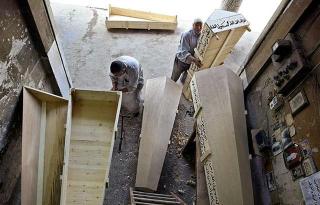"The situation has worsened dramatically. We cannot cope."
 Overflowing morgue
Overflowing morgue testament to Iraq's
mayhem
27 Jul 2005 13:31:39 GMT
Source: Reuters
Link Here
By Luke Baker
BAGHDAD, July 27 (Reuters) - If anyone had any lingering doubts about the full extent of violence in Iraq, they need only visit Baghdad's morgue.
The fridges and autopsy rooms of the beige stone block are crammed full of corpses, some of them so badly mutilated or decomposed that identification is nearly impossible.
Every day, around 30 new bodies arrive, the latest victims of a two-year wave of war, crime and insurgency that has left coroners struggling to keep up with the chaos.
All are classified as "suspicious deaths" and the vast majority have been shot, says Faik Amin Baker, the director of the Medical Legal Institute, which oversees the morgue.
More alarming still is that these are only the bodies that require an autopsy; they do not include those that die of natural causes or in attacks where the cause of death is clear.
"Before the war we used to get maybe 250 bodies a month. Now it is 800 or 900 a month from the Baghdad area alone," says Baker, who trained at Guy's Hospital in London and has overseen operations at the morgue for the past 15 years.
"The situation has worsened dramatically. We cannot cope."
While it is difficult to make comparisons with other violent cities around the world because Iraq is also a war zone, the number would give Baghdad a rate of somewhere around 230 "suspicious deaths" each year for every 100,000 residents.
In Bogota, Colombia, often considered one of the most violent cities in the world, the murder rate seldom exceeded 90 per 100,000 even at the peak of the 1990s drug wars.
BURYING THE UNCLAIMED
The situation in Baghdad has grown so bad that corpses not claimed from the morgue after a few weeks are now being buried in makeshift graves to make room for new arrivals.
Since the beginning of the year, more than 400 unclaimed or unidentified bodies have had to be dealt with in this way.
They are buried by municipal authorities in Baghdad or by a Shi'ite Muslim volunteer group that takes the corpses to a cemetery in Najaf, a religious city south of the capital.
Pictures are taken of the bodies beforehand, and as many other details as possible are collected, so that if relatives do eventually turn up, the deceased can be tracked down.
"We have records, we have death certificates, we are burying them in a certain place," said Baker, playing down concerns that a new form of mass grave may be emerging in Iraq.
Each day, dozens of families arrive at the morgue looking for missing relatives. They view pictures of the dead on a computer, trying to identify loved ones. If the pictures are unclear, they are allowed to trawl through the morgue's vaults.
"It was horrible, terrible," said Yassin, a driver employed by Reuters who this week spent hours searching for his lost brother, whose body appeared to have been left for days in the sun after he was shot dead, burning his face beyond recognition.
"I knew it was him only by his shorts and a tattoo on the inside of his arm."
Baker says that every month up to 20 percent of the bodies are unclaimed -- nameless or lost victims of Iraq's mayhem.
"We keep them for as long as we can, but how long depends on how many more bodies we get," he said. "At the moment we are keeping them for maybe three weeks, but sometimes it is less."
--Ghastly, just horrifying.---




0 Comments:
Post a Comment
<< Home